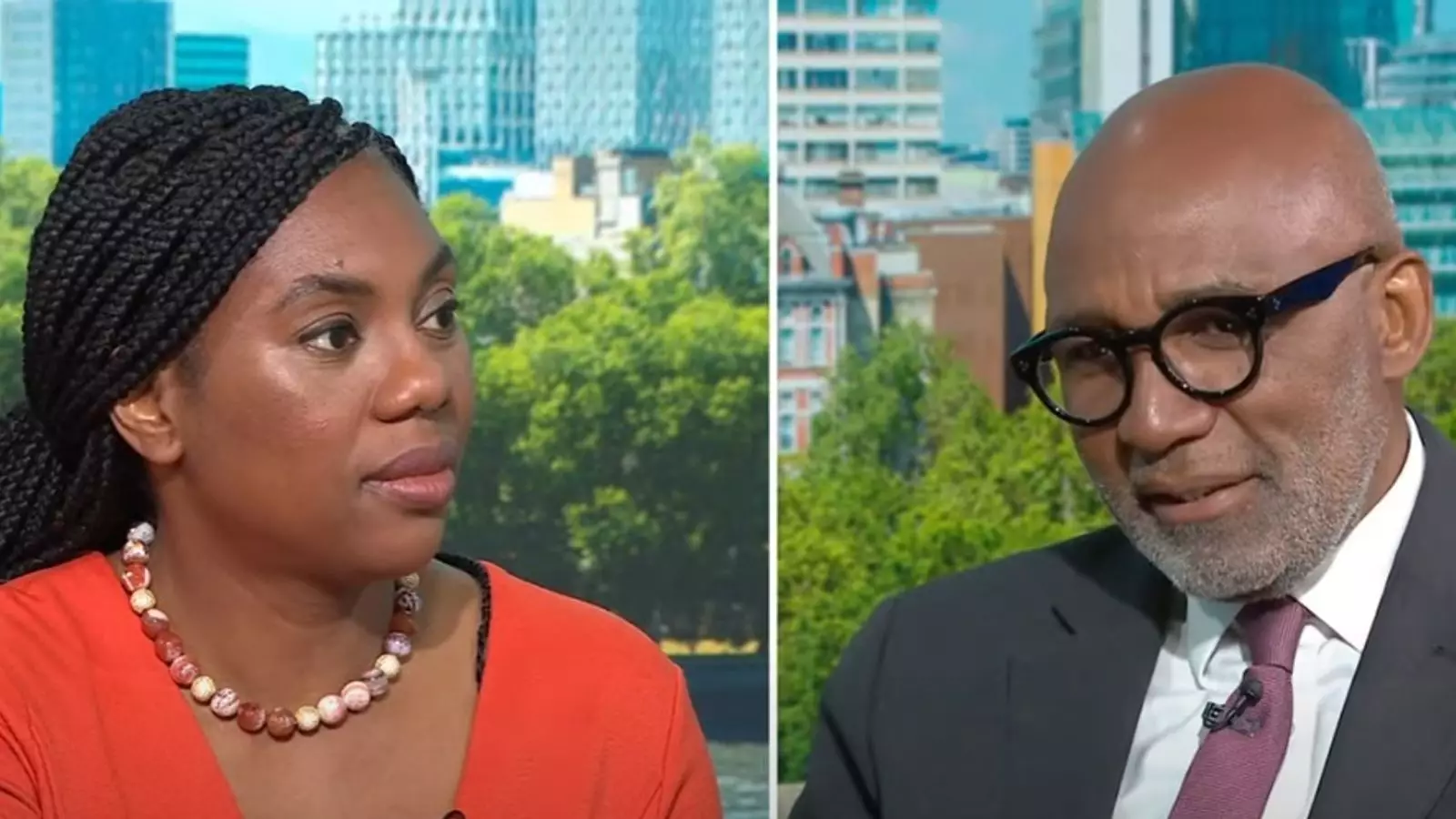In the unpredictable arena of British politics, few figures are as captivating—and controversial—as Kemi Badenoch. As she grapples with the aftermath of local council elections, her recent comments hint at a political strategy reminiscent of a chess player maneuvering pieces across a volatile board. While she flatly rejects any national alignment with Nigel Farage’s Reform UK, the prospect of local coalitions has not been dismissed. Badenoch’s approach illustrates a pragmatic willingness to adapt, but it also unveils a deeper narrative of discontent within the Conservative Party and its often-fractured bonds.
The potential for local agreements with Reform post-election raises eyebrows, especially as the Conservative Party languishes in a state of uncertainty. Badenoch’s insistence on prioritizing community over party lines may resonate positively in theory, yet it smacks of desperation amidst an alarming decline of traditional Tory strongholds. In a sense, her strategy reflects an awareness of reality—the recognition that in certain councils, survival hinges on practical alliances rather than ideological purity. However, this necessity underscores a troubling trajectory for a party that once thrived on its ability to wield a clear and decisive message.
A Party in Decline
The shadow of impending losses looms large over the Conservatives as they approach the polls on May 1st. Facing 23 councils, many of which were once considered bastions of Tory dominance, their prospects for maintaining control seem grim. Badenoch’s cautionary remarks hint at an acknowledgment that the party may need to brace itself for significant defeats. Given that the last local elections were held under the charismatic leadership of Boris Johnson—who benefited from the COVID vaccine boost—Badenoch’s current climate looks vastly different.
This decline prompts critical questions about whether a tactical pivot to local coalitions is a clever response to an entirely new political reality or simply a symptom of the Conservatives’ internal fractures. Badenoch’s move to consider local pacts appears to be a last-ditch effort to stave off complete electoral collapse rather than a confident embrace of coalition politics. Moreover, while advocating for coalitions with Reform, she is simultaneously distancing herself from Farage, reinforcing her attempt to maintain the traditional Conservative base. Yet, can one simultaneously embrace pragmatism and adhere to rigid ideological stances without falling into contradiction?
A Tapestry of Political Mistrust
The political landscape is rife with mistrust, and Badenoch’s caution against “stitch-ups” prior to the elections reveals much about the fabric that currently holds the Conservative Party together—or lacks to do so. Her remarks signal a recognition that political maneuverings are not merely about strategy; they’re also about public perception and credibility. Many voters are weary of backdoor deals; they seek authenticity from their elected officials. In this fraught climate, Badenoch must tread lightly—balancing the interests of party loyalty with the need to genuinely serve local constituents.
As speculation mounts around potential coalitions, voices from within the party—like Robert Jenrick and Ben Houchen—further complicate the narrative. The buzz around a possible alignment with Reform UK echoes loudly, particularly with some members suggesting that a united front might emerge out of sheer necessity to avoid handing power to the opposition. This acknowledgment of a possible coalition blurs the lines that Badenoch has tried so hard to draw. If key figures within the party advocate for unity with Reform, how can Badenoch maintain her stance against Farage without appearing out of touch with a significant faction of her own party?
The Future of Conservative Identity
The ramifications of these local elections extend beyond immediate electoral outcomes; they speak to the very identity of the Conservative Party. What does it mean for a party that traditionally prided itself on stability and consistency to consider coalition politics, even at the local level? Badenoch’s navigation within this complex web could either solidify her position as a pragmatic leader who understands the need for flexibility or paint her as a leader willing to compromise core principles in a bid for survival.
Moreover, her emphasis on a “credible Conservative offer” suggests that significant introspection is needed within the party. As voices from the left, including Labour’s Pat McFadden, pledge to resist coalitions with opposing parties, the Conservatives face a unique crossroads. If Badenoch’s strategy fails to resonate, will it ultimately lead to a further fragmentation of the party? The very essence of the Conservative brand may hang in the balance if local pacts with Reform create unexpected fissions within an already strained system.
In the shifting sands of British politics, Kemi Badenoch’s tactics could be seen as either a shrewd response to a brewing crisis or a precarious gamble that risks the very foundations of the Conservative Party. Edwards uncertainty has fundamentally challenged how the party will advance in a landscape that is increasingly resistant to traditional political dichotomies.

